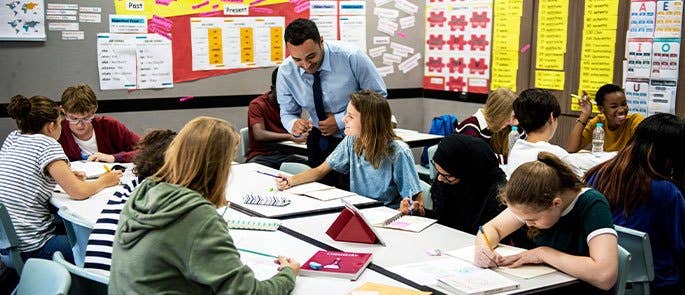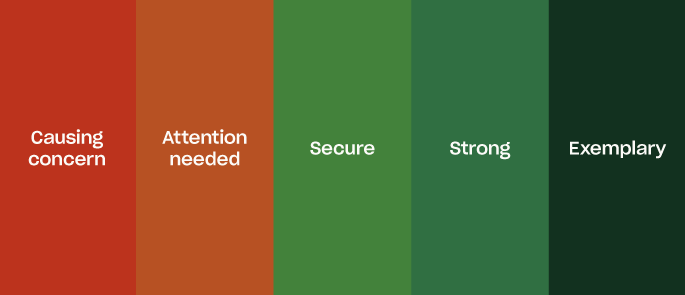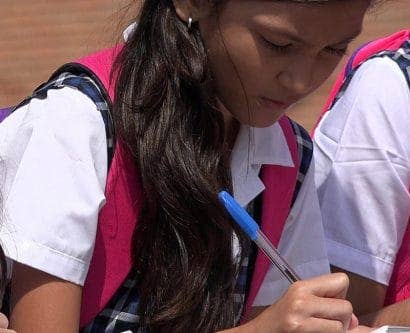Ofsted: How will the New Grading System Work?
For those who work in education, Ofsted is an all too familiar word. The non-ministerial department inspects services providing education and skills, such as schools and colleges, for learners of all ages. In 2024, the Department for Education (DfE) announced changes to how Ofsted would grade schools. These changes are intended to deliver better accountability and provide parents, guardians and carers with a more complete picture of how schools are performing.
It’s vital that those working in an education setting understand the parameters of the new grading system. In this article we will explore the proposed changes and outline everything you need to know about the new Ofsted School Report Cards.
What is Ofsted?
Ofsted is the Office for Standards in Education, Children’s Services and Skills. They are a non-ministerial department that inspects education services as well as services that care for children and young people. Ofsted seeks to raise the standards in education and social care and in so doing, improve lives. They inspect and regulate a wide range of organisations and individuals who provide education, training and care.
Ofsted’s main responsibilities are inspecting, regulating and reporting. They are responsible for:
Inspecting 
- Maintained schools and academics, some independent schools, colleges, apprenticeship providers, prison education and other educational institutions and programmes outside of higher education.
- Childcare, local authorities, adoption and fostering agencies, initial teacher training and teacher development.
Regulating 
- A range of early years and children’s social care services, making sure they’re suitable for children and potentially vulnerable young people.
Reporting 
- Publishing reports of their findings so they can be used to improve the overall quality of education and training.
- Informing policy makers about the effectiveness of the services they inspect and regulate.
Ofsted Inspection Framework
Ofsted inspectors use the education inspection framework when inspecting and assessing an institution. This framework sets out the criteria in which inspectors will make a judgement. The criteria are as follows:
Quality of Education 
Inspectors will make a judgement on the quality of education by evaluating the extent to which:
Intent
- leaders take on or construct a curriculum that is ambitious and designed to give all learners, particularly the most disadvantaged and those with special educational needs and/or disabilities (SEND) or high needs, the knowledge and cultural capital they need to succeed in life.
- the provider’s curriculum is coherently planned and sequenced towards cumulatively sufficient knowledge and skills for future learning and employment
- the provider has the same academic, technical or vocational ambitions for almost all learners. Where this is not practical – for example, for some learners with high levels of SEND – its curriculum is designed to be ambitious and to meet their needs.
- learners study the full curriculum. Providers ensure this by teaching a full range of subjects for as long as possible, ‘specialising’ only when necessary.
Implementation
- teachers have good knowledge of the subject(s) and courses they teach. Leaders provide effective support, including for those teaching outside their main areas of expertise.
- teachers present subject matter clearly, promoting appropriate discussion about the subject matter they are teaching. They check learners’ understanding systematically, identify misconceptions accurately and provide clear, direct feedback. In doing so, they respond and adapt their teaching as necessary, without unnecessarily elaborate or differentiated approaches.
- over the course of study, teaching is designed to help learners to remember in the long term the content they have been taught and to integrate new knowledge into larger concepts.
- teachers and leaders use assessment well, for example to help learners embed and use knowledge fluently or to check understanding and inform teaching. Leaders understand the limitations of assessment and do not use it in a way that creates unnecessary burdens for staff or learners.
- teachers create an environment that allows the learner to focus on learning. The resources and materials that teachers select – in a way that does not create unnecessary workload for staff – reflect the provider’s ambitious intentions for the course of study and clearly support the intent of a coherently planned curriculum, sequenced towards cumulatively sufficient knowledge and skills for future learning and employment.
- a rigorous approach to the teaching of reading develops learners’ confidence and enjoyment in reading. At the early stages of learning to read, reading materials are closely matched to learners’ phonics knowledge.
Impact
- learners develop detailed knowledge and skills across the curriculum and, as a result, achieve well. Where relevant, this is reflected in results from national tests and examinations that meet government expectations, or in the qualifications obtained.
- learners are ready for the next stage of education, employment or training. Where relevant, they gain qualifications that allow them to go on to destinations that meet their interests, aspirations and the intention of their course of study. They read widely and often, with fluency and comprehension.
Behaviour and Attitudes 
Inspectors will make a judgement on behaviour and attitudes by evaluating the extent to which:
- the provider has high expectations for learners’ behaviour and conduct and applies these expectations consistently and fairly. This is reflected in learners’ behaviour and conduct.
- learners’ attitudes to their education or training are positive. They are committed to their learning, know how to study effectively and do so, are resilient to setbacks and take pride in their achievements.
- learners have high attendance and are punctual.
- relationships among learners and staff reflect a positive and respectful culture.
- leaders, teachers, other staff and learners create an environment where bullying, learner-on-learner abuse or discrimination are not tolerated. If they do occur, staff deal with issues quickly and effectively, and do not allow them to spread.
Personal Development 
Inspectors will make a judgement on the personal development of learners by evaluating the extent to which:
- the curriculum extends beyond the academic, technical or vocational. It provides for learners’ broader development, enabling them to develop and discover their interests and talents.
- the curriculum and the provider’s wider work support learners to develop their character – including their resilience, confidence and independence – and help them know how to keep physically and mentally healthy.
- at each stage of education, the provider prepares learners for future success in their next steps.
- the provider prepares learners for life in modern Britain by: equipping them to be responsible, respectful, active citizens who contribute positively to society; developing their understanding of fundamental British values; developing their understanding and appreciation of diversity; celebrating what we have in common and promoting respect for the different protected characteristics as defined in law.
Leadership and Management 
Inspectors will make a judgement on the effectiveness of leadership and management by evaluating the extent to which:
- leaders have a clear and ambitious vision for providing high-quality, inclusive education and training to all. This is realised through strong, shared values, policies and practice.
- leaders focus on improving staff’s subject, pedagogical and pedagogical content knowledge to enhance the teaching of the curriculum and the appropriate use of assessment. The practice and subject knowledge of staff are built up and improve over time.
- leaders aim to ensure that all learners complete their programmes of study. They provide the support for staff to make this possible and do not allow gaming or off-rolling (there is no legal definition of ‘off-rolling’; however, Ofsted defines ‘off-rolling’ as the practice of removing a learner from the provider’s roll without a formal, permanent exclusion or by encouraging a parent to remove their child, when the removal is primarily in the interests of the provider rather than in the best interests of the learner – off-rolling in these circumstances is a form of ‘gaming’).
- leaders engage effectively with learners and others in their community, including – where relevant – parents, carers, employers and local services.
- leaders engage with their staff and are aware and take account of the main pressures on them. They are realistic and constructive in the way that they manage staff, including their workload.
- leaders protect their staff from bullying and harassment.
- those responsible for governance understand their role and carry this out effectively. They ensure that the provider has a clear vision and strategy and that resources are managed well. They hold leaders to account for the quality of education or training.
- those with responsibility for governance ensure that the provider fulfils its statutory duties, for example under the Equality Act 2010, and other duties, for example in relation to the ‘Prevent’ strategy and safeguarding, and promoting the welfare of learners.
- leaders have created an open and positive culture around safeguarding that puts pupils’ interests first. This means they:
- protect pupils from serious harm, both online and offline.
- are vigilant, maintaining an attitude of ‘it could happen here.’
- are open and transparent, sharing information with others and actively seeking expert advice when required.
- ensure that all those who work with learners are trained well so that they understand their responsibilities and the systems and processes that the provider operates and are empowered to ‘speak out’ where there may be concerns.
- actively seek and listen to the views and experiences of learners, staff and parents, taking prompt but proportionate action to address any concerns, where needed.
- have appropriate child protection arrangements, which: identify learners who may need early help, and who are at risk of harm or have been harmed – this can include, but is not limited to, neglect, abuse (including by their peers), grooming, exploitation, sexual abuse and online harm; secure the help that learners need and, if required, refer in a timely way to those who have the expertise to help; and manage safe recruitment and allegations about adults who may be a risk to learners.
- are receptive to challenge and reflective of their own practices to ensure that safeguarding policies, systems and processes are kept under continuous review.
Inspectors will always report on whether arrangements for safeguarding learners are effective.
The former education inspection framework has been modified and become education inspection toolkits. There are separate toolkits for early years inspections, school inspections, independent school inspections, further education and skills inspections and initial teacher education (ITE) inspections. The toolkits examine many of the same areas as the old framework and introduce additional categories that will now be assessed.
The new toolkits aim to:
- Build on the strengths of the education inspection framework, keeping the elements that are working well, such as a focus on the curriculum.
- Consider the provider’s context and establish a level playing field for those working in challenging circumstances, while maintaining high standards.
- Introduce a spotlight on areas where Ofsted need to be a more effective lever for change – such as their focus on behaviour, attendance and inclusion (including shining a spotlight on those who are disadvantaged and those who have SEND).
- Strengthen the balance between curriculum intent, implementation and impact – ensuring a focus on how well leaders develop teaching, particularly for those who are disadvantaged or have SEND, through high-quality professional development.
- Be a useful tool for both the sector and inspectors to support continuous improvement.

The new report cards reflect the changes in the inspection framework and inspection methodology. They introduce a five-point grading scale that is designed to give a more comprehensive insight into how a school is performing. The grading scale will be explored in more detail later in the article. The new report cards will replace the single word judgements which according to the DfE were not working for parents and schools. Research from Ofsted highlighted that fewer than 4 in 10 parents and only 29% of teachers supported one-word judgements. Single word judgements have been under scrutiny for some time and the full extent of their damaging potential was brought to public attention following the passing of Ruth Perry in 2023.
Mrs. Perry was a headteacher who died by suicide in 2023 following an Ofsted inspection during which her school was downgraded from ‘outstanding’ to ‘inadequate.’ The coroner presiding over Mrs. Perry’s inquest concluded that the Ofsted inspection had contributed to her death. Following her death, Ofsted stood by their rating and they were widely criticised for their ‘defensive and complacent’ approach to Mrs. Perry’s tragic passing. Since 2024, Mrs. Perry’s family have campaigned for changes to inspections and the public attention surrounding her death has arguably increased the pressure on Ofsted to make significant reforms.
Whilst it’s hoped that the new changes will better support parents, pupils and educators, it’s worth noting that they have been criticised by Mrs. Perry’s sister, Professor Julia Waters, for not bringing about enough change. Professor Waters, along with school leaders, national organisations, trade unions and former inspectors, has written an open letter to the education secretary Bridget Phillipson asking for a delay in the proposed changes in order for Ofsted to ‘take the time needed to get change right.’
Want to Learn More?
Our wide range of CPD Courses for Teaching and Education can help you to build on your existing knowledge and teach you new skills. Courses such as Prevent Duty Training and Online Safety and Harms will teach you everything you need to know about keeping children safe, ensuring you can confidently support your students at all times.
Ofsted Report Cards
In the past, Ofsted inspectors would use the framework above to give institutions single word judgements in the form of grades. The former grading scale was as follows:
- Grade 1 – Outstanding
- Grade 2 – Good
- Grade 3 – Requires improvement
- Grade 4 – Inadequate
Under the proposed changes, inspectors will no longer give single word judgments and will instead use School Report Cards to give a more comprehensive insight into how a school is performing across different categories. It’s hoped that the new report cards will hold schools to account across a broader range of measures, thereby supporting the DfE’s goal to achieve higher standards across all schools.
From Autumn 2025, report cards will be used to assess schools across eight areas and a separate section of the report card will detail whether a school meets their safeguarding duties. The eight areas that will be assessed are:
- Leadership and governance
- Curriculum
- Developing teaching
- Achievement
- Behaviour and attitudes
- Attendance
- Personal development and well-being
- Inclusion
There will also be evaluation areas for early years and sixth form provisions in schools where applicable. The eight assessment areas echo the previous framework with additional assessment areas that seek to give a more holistic view of a given educational institution. The areas have been selected as they represent the component parts of great education provisions and because they reflect the different priorities and language used within each remit at each stage of the education system.
There are five possible colour coded grades that a school can receive for each area. These are:

- Causing concern – lowest quality provision (red) – needs urgent action to provide a suitable standard of education and/or care for children and learners.
- Attention needed (amber) – some aspects of provision are inconsistent, limited in scope or impact and/or not fully meeting the legal requirements, the expectations set out in non-statutory guidance, or the professional standards required, where applicable. However, inspectors have determined that leaders have the capacity and means to make the necessary improvements.
- Secure (light green) – the provider is offering a secure standard of education. This includes meeting the legal requirements and the expectations set out in non-statutory guidance, as well as the professional standards required of the particular type of provision, where applicable.
- Strong (green) – practice is consistently secure across different year groups, key stages and subjects/aspects of learning. Leaders are working above and beyond the legal and professional standards expected of them.
- Exemplary – highest quality provision (dark green) – a provider where all evaluation areas are graded as at least secure and, within an evaluation area, that is consistently strong, there is a feature of practice that could be considered as exemplary.
Safeguarding criteria will be assessed as either ‘met’ or ‘not met.’ This is because Ofsted expects all providers to be both compliant with statutory requirements and instil an open and positive culture around safeguarding. As such, providers are either doing everything they can to keep children and learners safe, or they are not.
Ofsted proposes that under the new scale the middle three grades (attention needed, secure and strong) would typically capture where most providers sit across the range of evaluation areas. An inspector may recommend a specific feature of a leaders’ work as ‘exemplary’ when that provider had been graded as consistently strong in all themes of a particular evaluation area and at least secure across all other evaluation areas. All considerations of exemplary practice will be moderated and confirmed by the national quality and consistency panel. Ofsted intends to share examples of exemplary case studies through their Ofsted Academy so that others can learn from best practice.
Once the on-site element of an inspection has ended and the provisional grades are confirmed through quality assurance processes, the report card will be published on Ofsted’s website. The presentation of the report card will enable parents to have both an ‘at-a-glance’ insight with the different areas being categorised under one of the five possible grades and a more indepth understanding, with longer descriptions available on what an inspector found in each category.
How will the Changes Impact Schools?
The report cards are part of a larger overhaul of the Ofsted inspection process. Other changes include:
- New internal consistency reviews
- Pre-inspection phone calls
- Ungraded inspections
You can read more about these proposed changes and how they might impact schools here.

Focusing on the changes that the report cards and new grading system will bring, inspectors will now return to schools with areas deemed as needing attention more frequently. This will enable them to assess whether these areas of weakness have been addressed and improved enough to support a child’s education. In areas in which a school is ‘causing concern’ the DfE will step in and take action to address those issues.
Arguably, the main changes that the report cards and new grading system will bring is in the information that it will provide to the public. The report cards will offer a more comprehensive insight into how an establishment is performing by showcasing what a provider is doing well and where further work is needed. This insight will enable parents, guardians and carers to have a more thorough understanding into how a school is performing as grades will be supported by short explanatory descriptions that summarise an inspector’s findings. It’s hoped that this approach will provide better nuance for both parents and professionals and that the move away from an overall, one-word, effectiveness grade will reduce anxiety for professionals.
The new reforms to how Ofsted inspects and reports on educational institutions is intended to provide a more comprehensive insight into how establishments are being run. This insight will better support schools, local authorities and parents to provide children with the best possible education. Whilst the reforms have been criticised by some for not going far enough, they arguably showcase a much needed change in direction for how Ofsted operates.
Further Resources:
- Safeguarding Children Legislation: Guidance for Schools
- Mobile Phones in Schools Policy: Free Template
- CPD Courses for Teaching and Education











